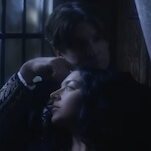When asking Devine what song warranted his derision, his response was instantaneous: the lead single from Collective Soul’s self-titled 1995 album, “December.” It wasn’t the band’s first hit—that designation goes to the eventually meme’d “Shine”—but it’s one that has stuck with him since he first heard it at the age of 15. And though he proudly wears his love of ’90s alt-rock on his sleeve—proved by his full-album cover of Nirvana’s Nevermind—for Devine “December” remains unforgiveable.
KD: That’s definitely part of it. What was also interesting about that song to me was even at the time, I was 15, and I got in to indie-rock music through popular alternative-rock music. I was 12 when Nevermind came out, and Nirvana begat Pearl Jam begat Smashing Pumpkins and that, after a little while, begat Sonic Youth and The Pixies and Superchunk. I was indoctrinated to that kind of stuff by that point, so Collective Soul was so unforgiveable. [Laughs.] If I had maybe heard it in 1992, there’s an outside chance that I would have been un-indoctrinated enough to still be like, “This is kind of cool.”
But it always felt to me like that band was a prime example of wolf in sheep’s clothing—or sheep in wolf’s clothing is maybe more appropriate. They were sort of capitalizing on that grunge, alternative-rock boom, but they were an adult-contemporary band. Even the guitars on the songs are not like anything anyone would ever confuse as menacing or anything like that.
AVC: It’s far more welcoming than it is menacing.
KD: I was going to say that it was very welcoming, except for the fact that it is absolutely horrifying. [Laughs.] I think even at that point [Collective Soul’s] music sounded immediately dated. There’s something about that sound; I didn’t like the [imitates the riff to “Shine”]. I didn’t like that song; that was off-limits immediately. Just to out myself as someone whose tastes were not totally discerned: 15-year-old me was also like, “I really like those cool bands and I also kind of like Sixteen Stone by Bush.” I was transitioning, and even then this was unacceptable. There was something about the chord progression, the vocal melody, the snare-drum sound, the backing vocals, and in particular the lyrical content of “December”; I can tell you there’s been much movement in my life over the years about things I liked to things I didn’t, things I didn’t like to things I do, and I went back and revisited [“December”] for our conversation. I still hate that song every bit as much as a 33-year-old man as I did a 15-year-old kid.
AVC: Did you have knowledge of production that made you hate how it sounded, or was it just a visceral reaction to how slick it was?
KD: I was making four-track recordings, and I think maybe my first band had done a demo in a studio on Staten Island. But I had no concept of anything engineering-wise, and I’m still not super well versed in that stuff, but I was un-versed entirely in it in 1995. I did know—this says a lot about the player, and not to dog this guy from Collective Soul—but I really didn’t like the snappy ping of the snare drum. There was something about it that just sounded really tight and cheesy to me. I also know I was comparing everything at that point in my life, drum-wise, to [Nirvana’s] In Utero. And that is a very hard metric to live up to, even 20 years later. It’s like, “Oh yeah, nothing really sounds as good as the drums on In Utero.”
In terms of the chord progression, again, it was not intellectual. But this felt more to me like they were trying to achieve something sinister through some of the little half-step chord things they do in that song, like the way the chord progression resolves itself. And the video was a little mysterious and kind of swirly at points. It was basically a lie. I felt like I was being lied to. Even as a kid I was like, “This isn’t disorienting. There’s nothing macabre about this. There’s nothing even really emotional about this.” It sounded like something I could write, and that’s not necessarily a compliment when you’re 14 and 15.
In high school I had a friend, and I’m still friends with him, he would use the phrase “the hoheem.” It described the embarrassed chill you’d feel when you would see certain things happen in the world. You’d watch an episode of The Wonder Years, and Kevin Arnold would do something super-embarrassing that either his dad or Winnie Cooper would end up being really upset with him about, and you were cringing, and that’s the feeling I get when I’m talking to you about this song. It’s uncomfortably shitty in its execution.
AVC: I got that feeling watching Collective Soul videos and hoping no one would come and look over my shoulder.
KD: I apologize for forcing you to do research for this. It’s bad news.
AVC: My Internet history is a document of trying to find out if Collective Soul is a Christian band—
KD: Are they? Did you find the answer to that?
AVC: They’re vocal about not being a Christian band, but looking at the lyrics for “December,” there’s a religious underpinning even if that wasn’t intended. Could that also have caused your reaction to it?
KD: I think that is a really interesting perspective, because I don’t know if I was intellectually aware of that at that time, and it would be dishonest if I tried to act as if I were now. I just remember that on every aesthetic level, this song was just offensive. What I do wonder about is: I was 15, I was raised Catholic, and I grew up in a Brooklyn Irish family, so it’s a kind of specific, provincial, Irish Catholicism. I think 15 was about the time I went to a Catholic high school and came home from school one day and told my dad, “I had this moment today and I don’t think I believe in any of that stuff.” My dad was like, “All right. Well, you’re going to go to church as long as you live in the house.” And that was the agreement: I would go to church every Sunday, but I was not invested or involved anymore. And that pilot light never went back on for me with that.
How that pertains to the Collective Soul song is that I was definitely going to hardcore shows and punk rock shows at that point. And anti-religious and, in specific, anti-Christian [invective] was super-heavy in the air at those shows, as was veganism and a nascent kind of socialism. I never played punk rock or hardcore music strictly; I was always in a band that kind of sounded like the stuff I described earlier, but the hardcore kids let us play with them because we were young and they were like, “Oh, that’s cute.” [Laughs.] But I wonder if that was subconsciously part of it.
I do know the lyrics [are] vague, but—in that guy’s semi-defense—a lot of ’90s alternative-rock has this vague martyr/Jesus thing that those guys tended to use. I feel like they got lazy, and they wrote from that perspective. It was this conflicted, maybe Jesus-in-the-garden thing, where they’re like, “Don’t follow me,” or whatever he says in that song. It’s almost aware of your Dionysian powers as a rock star. It was the Kurt Cobain thing: It was salable and marketable to act like you didn’t like being there, even though you really wanted to be there. I can definitely remember my friends and I being in a VFW parking lot making fun of that aspect in all of that music. But I also think, now that you’re mentioning it, even the chorus, [Sings.] “Turn your head / Now, baby just spit me out,” there’s a biblical passage about the agnostic being warm spit, and it’s “pick one side or the other.” That song, conscious or not, has an aspect of it.
I can tell you what deserves special mention: There is a background, call-and-response vocal part that comes late in the song, and I’m going to sing it to you, so I’m sorry: “December promise / You gave unto me / December whispers / Of treachery.” Even just singing that to you made me want to smack myself in the face. There are some things you hear and just love them without knowing why, and some things where it is visceral how much you can’t… I just can’t. If you could see me, if this was video: I’m sitting here talking to you and as I’m speaking that line and thinking about it, and I’m pinching my chin in disgust. I couldn’t believe no one in the room, no matter what your tastes were or what your background was, there wasn’t one guy in the room that was like, “You know what, this sucks. Let’s pick another thing.” [Laughs.]
AVC: “Let’s do anything but that.”
KD: Again, it’s just proof positive that I’m not the guy who knows what the marketplace wants, because they did quite well for themselves.
AVC: Do you think it’s stuck with you because it’s one of the last things you had to endure before immersing yourself in more underground music?
KD: “Enduring” is a great word because even by the time I got to college, which was ’97, it just became easier to not engage. There were more like-minded people, or maybe there was less time to be listening to the radio or whatever it was. My informers changed and the input avenues changed, so it was easier to hang out with other people that liked Belle & Sebastian and Elliott Smith or whatever else I was getting into at that point.
I do remember thinking this then, because I worked at Gap Kids and Old Navy. I wonder if [“December”] was on one of those tapes that they would play in the store. I’m having some memory of folding sweaters and thinking about how with this song they tried to match it to a seasonal chill. I feel like it’s something where someone sat down and was like, “You know what would be a cool concept for a song? If we wrote about December, and what that would make you feel like, you know?”
I’m usually not someone who viscerally hates things. I know that’s a strong word, and that we’re having fun with it for the purposes of this feature. And I have to say I feel slightly bad dogging them so hardcore. I’m sure they’re great people and I wish them all the best in their careers and all that. But as far as taste goes, it was so easy for me to default to this song because it’s one of the few things that I found… Artistically, I really found it irredeemable on a music level for all the reasons I said, and probably reasons that are so much more reflexive and inexplicable, too. It’s something [where] you hear it and you have a rash-like aversion to it, and this is song like that for me.
AVC: And doing this feature just brought that back.
KD: Prior to this I haven’t even heard the song in maybe a decade, and the recall was total. Oh my God, it was an alternative-rock Ouija board. Something just floated right back to the surface instantly.
AVC: Have you met someone that’s ever tried to defend the song to you?
KD: No, but I also haven’t spoken about it with the band. Maybe if I was like, “Hey Collective Soul guys, what the fuck was up with that song?” They might have good reasons why they wrote it. That’s part of why I had that momentary flinch, because when my friend said “everybody” he meant in our little corner of the universe. Who do you know that’s like, “You know what’s fucking rad? Any of those Collective Soul songs.” [Laughs.] No one you know would say that. Maybe that’s presumptuous because I don’t know you very well, but I bet it would be hard to find someone in your life. Maybe someone’s mom would be like, “Oh I really like that song ‘The World I Know’ by Collective Soul,” but I don’t even know if someone’s mom would like “December.”
AVC: It’s such a failure that even moms wouldn’t like it?
KD: Its massive failure is that it is dressed up as something. It’s dressed up as weird, and it’s not weird. There are dark overtones to it and the winding nature of some of the chord progressions, but it’s not dark. There’s the quasi-philosophical, but impenetrably murky nature of the lyrics. The whole martyr thing is so dated and embarrassing in its clichés. When all those things are combined, it’s bad, but too weird for a Midwestern mom. It’s trying to be weird, so it weirds-out the person in the middle. But anyone even remotely to the left of the middle knows it’s not weird at all. In its attempt to be these things, it ends up negating itself completely. It just ends up being wrong. I feel like doing this has been an exorcism for me. I can just let it go now.








































